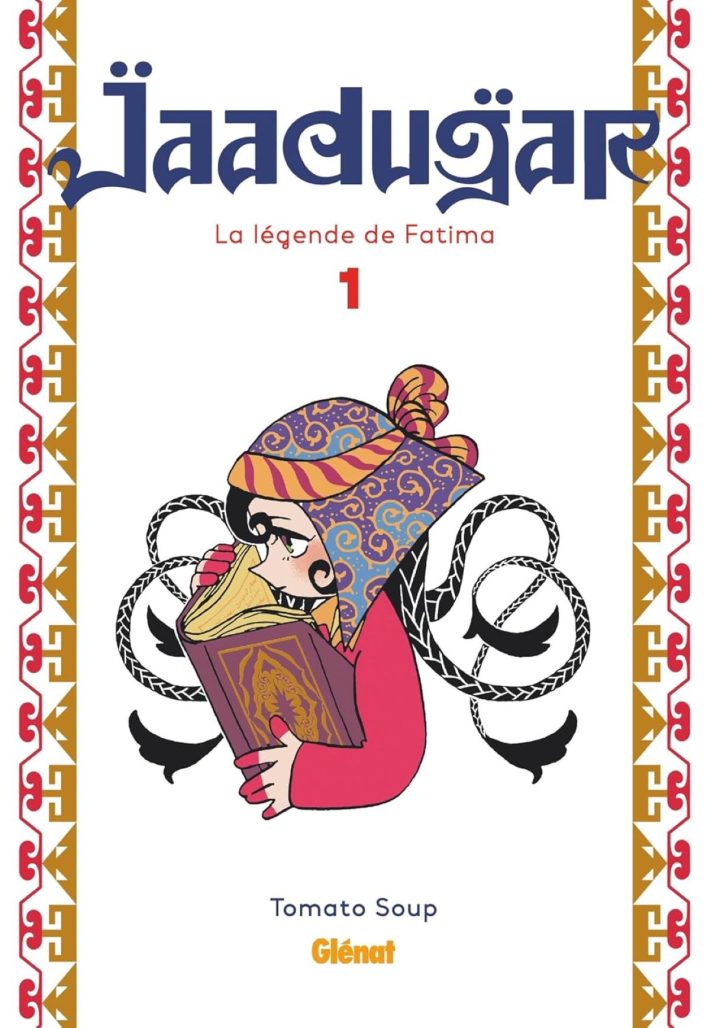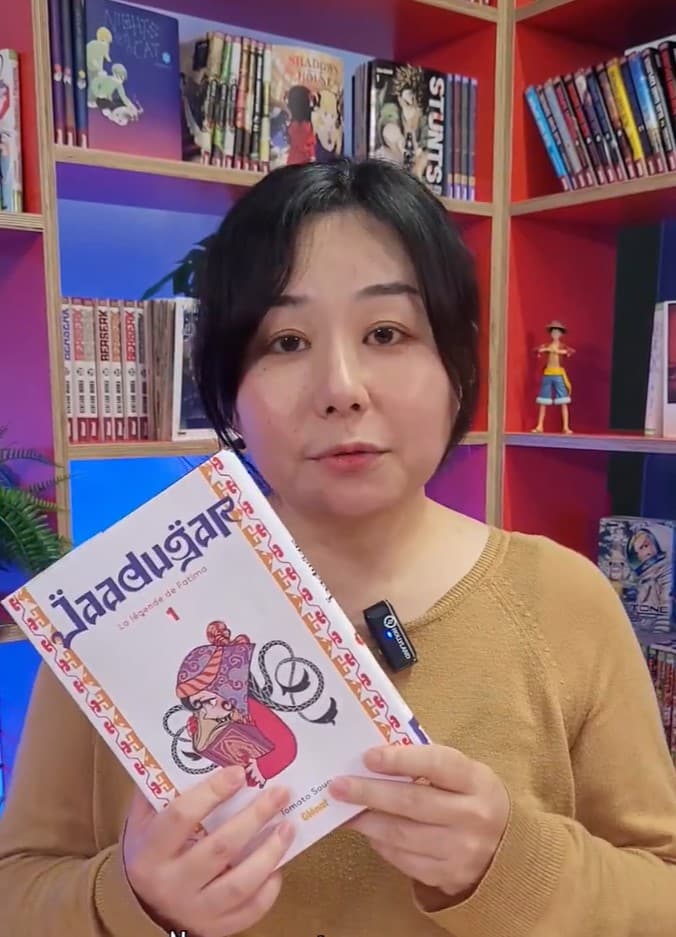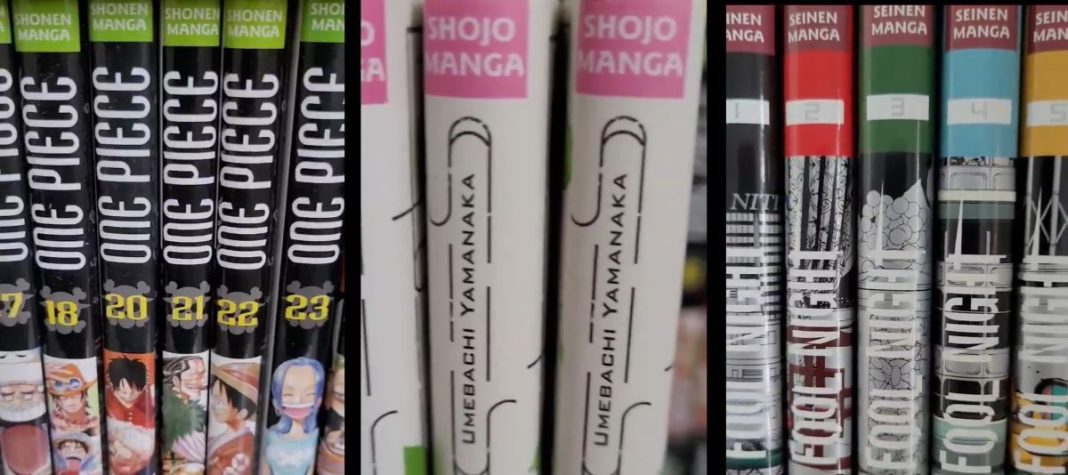French publisher Glénat is to move away from traditional Japanese demographic classifications for its manga line. Starting September, work traditionally designated Shonen/Shojo/Seinen/Josei will instead have keyword descriptors of content and an age rating on the back cover. The move will begin with their release of Tomato Soup’s Jaadugar: la légende de Fatima [Tenmaku no Jaadugar] (Volume 1) on September 18.

To date, Glénat had previously followed a colour coding system and collection label on the spine for its manga – with Shonen (traditionally targeted at boys) being green, Shojo (girls) in pink, and Seinen in burgundy. While in Japan “Seinen” denotes work for an adult male readership, in France it is broadly treated as a blanket adult category – merging work originally published as Seinen and Josei in Japan.

The move was announced by the publisher via a video on social media presented by Glénat editorial director Satoko Inaba, who talked through and demonstrated the format change with a copy of Jaadugar. Inaba said the move was partially driven by changing readership habits in Japan and France which are no longer discreetly gender or age driven:
“Magazines in Japan are starting to change. The audience is changing too. Works are a little less restricted to specific categories. So, to keep up with the natural evolution of manga, we’ve decided to move away from these categories for books.”
Adding:
“For Jaadugar, which will be the first title to come out in this format, we have a blue spine with a layout adapted to the Japanese volume. And on the back cover, you’ll find key words to indicate the subjects in the book. So for Jaadugar we’ll have: ‘intrigue’, ‘history’, ’empowerment’.”
The publisher hopes to make this an industry change but knows that it will take some time for book distribution databases to shift to the new system. While the book’s spine will no longer indicate it as “seinen”, Jaadugar is listed on Glénat’s website as such.
Inaba:
“[Book retail and distribution] databases will contain classifications that we won’t be able to ignore. We’re going to have to fill them in so that the books can go to your booksellers. Effectively, Jaadugar will fall into the “Seinen” category, which is the closest since we’re talking about adult women: Josei in Japan.
“Developments are always slow in coming, so we’ll need a little time for these databases to change. I think we also need to give ourselves time to update our websites. We’re counting on you to support us in this process.”
Glénat is the leader of France’s competitive manga market. A Statista study in 2019 reported the publisher accounting for 23.9% of sales, followed by Pika (13.4%) and Kana (12.5%). This study was conducted before the pandemic when the market exploded in France to over half the overall bande dessinée/comics market, and a fifth of the entire book market. Glénat – which is a huge publisher of bande dessinée, graphic novels, and traditional books – has been in the manga game in France for over thirty years and its inventory includes Akira, Dragon Ball, Ranma ½, Berserk, and One Piece.
Manga – much like bande dessinée (comics) are widely sold in France with them being available in supermarkets, bookstores and specialist comic shops. While there is no uniform pattern of organisation of manga on shelves, some stores – such as Manga Kat in Bordeaux and Angouleme – shelve books in a similar manner to traditional bande dessinées: by genre, age (kids section), and major authors. France is often regarded as the largest manga market in the world outside Japan.
The move has not been universally welcomed. Some critics on social media have suggested that moving away from the traditional Japanese classification system will lead to an overemphasis on more marketable Shonen (boys) and Seinen (adult male) titles to the detriment of Shojo (girls) and, particularly Josei (adult female). There is also scepticism about change happening at the book retail level.
Satoko Inaba, Editorial Director (Glénat) video transcript [translated by DeepL]:
“Hello, I’m Satoko Inaba, Editorial Director of Glénat. I’m here to play a little game with you. Can you guess what’s different about Jaadugar, which is a new title coming out in September, compared with the other series we’ve already published?
“I’ll show you the book. [slowly turns the book] So, were you able to find it? It’s on the back.
“Until now on Glénat manga, we had a colour code and then a little label indicating the name of the collection. So Shonen in green, Shojo in pink, Seinen in burgundy. We’ve decided to free ourselves from these collections.
“Magazines in Japan are starting to change. The audience is changing too. Works are a little less restricted to specific categories. So, to keep up with the natural evolution of manga, we’ve decided to move away from these categories for books.
“For Jaadugar, which will be the first title to come out in this format, we have a blue spine with a layout adapted to the Japanese volume. And on the back cover, you’ll find key words to indicate the subjects in the book. So for Jaadugar we’ll have: ‘intrigue’, ‘history’, ’empowerment’.
“Taking Jaadugar as an example, this manga is originally published on a website that doesn’t specify a genre. However, it is run by an editorial team that produces Josei magazines. Josei is a genre that doesn’t exist in France. Because in France, for the moment, we’ve limited ourselves to the main categories: Shojo for young girls, Shonen for young boys, and Seinen for adults.
“At Glénat, then, you’ll find that there is no longer a classification for the book itself. On the other hand, the databases will contain classifications that we won’t be able to ignore. We’re going to have to fill them in so that the books can go to your booksellers. Effectively, Jaadugar will fall into the Seinen category, which is the closest since we’re talking about adult women: Josei in Japan.
“Developments are always slow in coming, so we’ll need a little time for these databases to change. I think we also need to give ourselves time to update our websites. We’re counting on you to support us in this process. Don’t hesitate to give us your feedback so that we can move forward together.”













Love the clarity in your writing. Easy to understand!
Comments are closed.